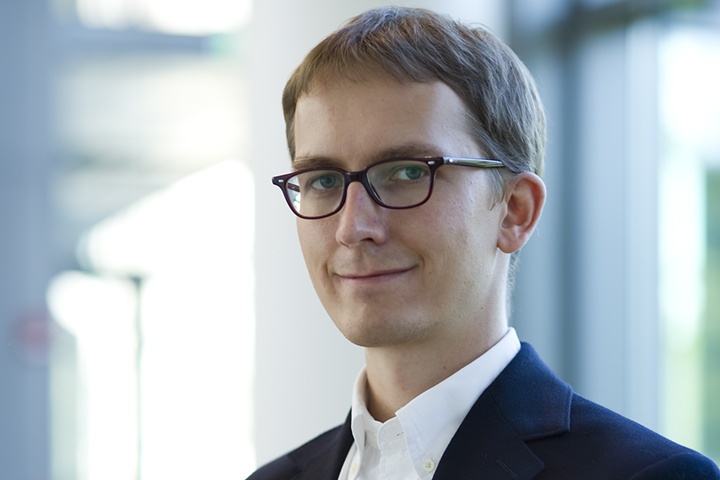New political theorist Lucas Stanczyk explores social justice, personal choice

MIT assistant professor of political science Lucas Stanczyk
One of the tenets of free societies is that individuals should be able to choose where they live and what kind of work they do. But are there times when broader societal needs supersede this principle?
Perhaps so, says incoming MIT assistant professor of political science Lucas Stanczyk. Stanczyk argues that if we agree that society must shoulder the burden of supplying certain basic goods and services – police protection, for example, but perhaps also education and health care – it follows that members of society must in some way share the responsibility for providing those services.
"I think it's true as a general rule that the state should protect freedom of personal choice, but that doesn't preclude government taking steps to ensure minimum standards," he said.
Stanczyk is a political theorist, but researches issues at the heart of some very practical problems – notably the inequitable distribution of basic services like health care, which can be much more difficult to access in poor and rural areas than in places that have more appeal to highly trained professionals.
Incentives are one possible solution, but they can only go so far, says Stanczyk, pointing out that a doctor might very well refuse to work in rural Africa for any amount of money.
"If we agree that there is something wrong with this situation, then either something is wrong with what the government is doing – laws and institutions aren't directing people to do this work – or government is OK, but the fault lies with individual people – they're refusing to take on these jobs in these places," Stanczyk said. The question then emerges: is it appropriate for a free society to compel people to do certain jobs?
Acknowledging that this situation arises because people don't want to live and work in certain areas, Stanczyk therefore investigates whether principles of justice can be used to constrain those personal choices.
If you agree that your society should provide its members with security, health care, education, and other benefits, but no one is stepping forward to do the necessary work, then the answer may well be yes, says Stanczyk.
"Perhaps you yourself have an obligation to choose certain careers or work in certain ways," he said. "And even if it would be wrong for society to compel you to work in a given career, you could be behaving unjustly by not electing to do so. We should pay more attention to this than we do."
There are clearly large, global forces at work in this area. Stanzyk notes, "Even when developing countries train doctors, they tend to congregate in urban centers and serve wealthy clients." They also emigrate in huge numbers, leaving their home countries bereft. For example, in predominantly rural Malawi, a country with fewer than 300 doctors for 15 million people, 97 percent of all physicians have urban practices. In Ghana, more than half of the doctors trained in the country emigrate, despite shortages at home.
Wealthy countries are not immune to the problem – the United States is expected to have a shortage of 800,000 nurses by 2020, and many rural areas are chronically underserved. But at the same time, America's affluence makes it an attractive destination for emigrants. "A quarter of U.S. physicians are foreign trained or born, with two-thirds of them coming from places with severe shortages," points out Stanczyk.
Stanczyk, who began professional life as a lawyer, will start at the Institute in January after receiving his PhD from Harvard's Government Department. He noted that he is pleased to be joining MIT, and cited the OpenCourseWare initiative as a good example of broad distribution of educational benefits. "The MIT community of political and social scientists is just extraordinary," he said. "There are so many people working on intense questions with practical applications."
He has already taught a few courses in MIT's Political Science Department, and said, "It was wonderful to teach MIT undergraduates, who are incredibly talented, hard-working, and humble – and eager to discuss questions of a just society."